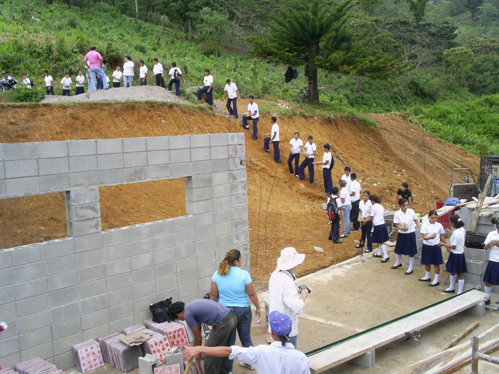Three Cups of Education

There sure has been a lot written on the web lately about the Greg Mortenson scandal. Was “Three Cups of Tea” more fiction than truth? I am afraid only Mr. Mortenson himself will ever be able to really answer that question. What I would like to do is speak a little to some of the criticisms I have read and why they may or may NOT apply to the work World Accord supports.
If you haven’t seen what the buzz is all about – well …check it out.! (Sorry it can’t be embedded by the video owner’s request – just click “watch on youtube” and it will take you there)
THE FIRST LESSON (CUP OF EDUCATION) – “FOR” OR “WITH”
It has been said that Greg Mortenson builds schools “for” Afghans and Pakistanis. According to the fastcompany.com blog entitled: What The Scandal Of “Three Cups of Tea” Author Greg Mortenson Is Really About, Adam Braun of Pencils of Promise says:
“The schools that aren’t being used are usually those built for locals, rather than those built with locals. Education is much more complex than just putting up four walls, so those that only focus on the build itself will see higher rates of school abandonment.”
In the same article, Laura Freschi of the Aidwatchers blog points out “most of the money CAI (Mortenson’s charity – Central Asia Institute) spent on schools–$3 million out of $4 million–went to building, not teacher salaries, school supplies, scholarships, or followup. CAI–and other organizations–are just dropping schools into Afghanistan and hoping teachers and students show up.”
At World Accord International Development Agency, we would agree with Braun. It is one reason why World Accord has never once built a school “for” anyone. Our volunteer-led Construction Expeditions only build schools “with” communities. Generally, a community our local partner is already working with makes a request for a school. The community supplies the land and generally has the footings laid before our volunteers arrive on the scene. Our volunteers work together with students, their parents and other community members to build a school.
CUP OF EDUCATION # 2: PROVIDING EDUCATION IS FOR THE STATE.
Laura Freschi of Aidwatchers would seem to imply that charity should support teacher salaries, school supplies and administrative support. I strongly disagree with Freschi’s views on this. Nearly ALL our funds for the construction expeditions go for infrastructure including desks. It is not sustainable for us to carry salaries, supplies and administrative costs. We will only build a school building where classes are already being held without proper educational facilities. If those things are not supplied by one level of government or other, building a school will be a fruitless exercise. In a blog entitled “Cup Half Empty” at foreignpolicy.com, Mosharraf Zaidi writes:
“Charity and philanthropy cannot service the needs of a country that has more than 70 million children between ages of 5 and 18. Only a state-financed education system, with serious oversight and accountability instruments built into it, can address the challenge here.” (in Pakistan)
Zaidi is right. We can’t do it for them but we can assist them in doing it for themselves.
THE THIRD CUP: EDUCATION ALONE IS NOT THE ANSWER.
The blog entitled “Three Cups of Fiction” at schoolingtheworld.org states:
“…the idea that building schools and getting every kid on the planet inside them is a solution to the problem of global poverty, for example, is a real whopper.”
We have to agree. That is why “education and schools” is only one aspect of a more integrated approach that World Accord develops in partnership with participating communities. The aim is to eliminate the barriers that hamper development. Of course we can’t eliminate all the barriers or the more institutionalized ones, but those the communities can address with our help. Sometimes that is just enough to clear the way for people to grow in capacity and become more self-determined.
To sum up. While we help communities in their efforts to create schools, education needs to be state supplied and still remains just one piece (though an important piece) of the puzzle and problem of global poverty.
